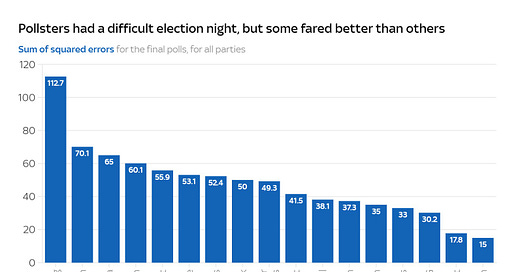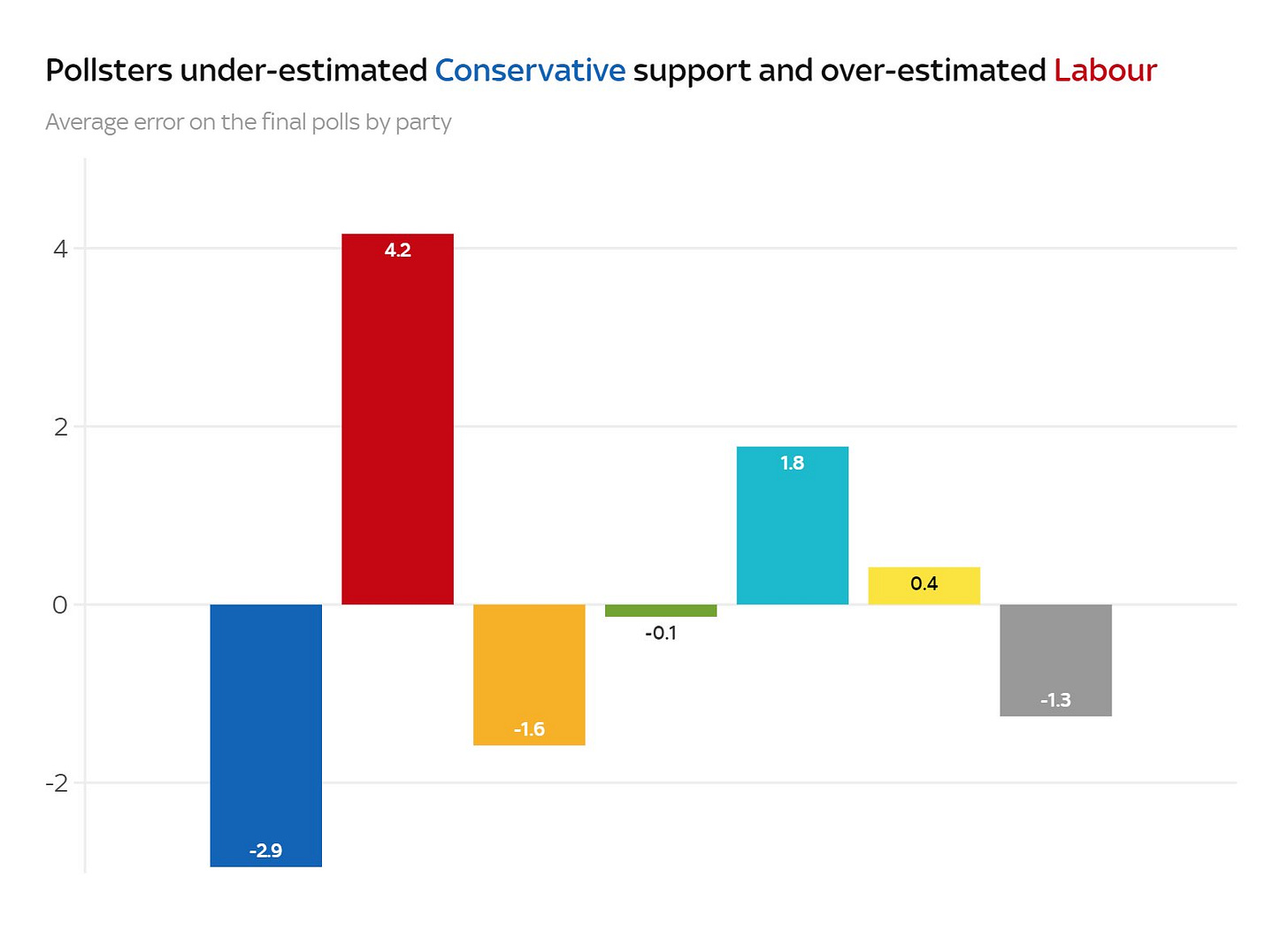Welcome to the 116th edition of The Week in Polls (TWIP). Let’s start the new Parliament with a look backwards, to how the polls did at the general election.
Then it’s a summary of the final pre-election polls from everyone followed by, for paid-for subscribers, 10 insights from the last week’s polling and analysis. (If you’re a free subscriber, sign up for a free trial here to see what you’re missing.)
Been forwarded this email by someone else? Sign up to get your own copy here.
Want to know more about political polling? Get my book Polling UnPacked: the history, uses and abuses of political opinion polling.
How did the polls do?
There’s a full table of the final poll from each pollster in the next section, but the overall picture painted by the national voting intention polls was pretty good. The polls got right that Labour was well ahead of the Conservatives, that the Conservatives were on course for their worst-ever vote share, that Reform was up in the teens but clearly behind the Conservatives (with the exception of two pollsters), that the Lib Dems were on a similar vote share to 2019 and that the Greens were looking at a record vote share.
Where the polls were less good was on the scale of the Labour lead. It did fall noticeably in the last few days of polling. Yet the final polls ranged from Labour leads of 15%-25% when reality served up a Labour lead of 11%.
The best way of judging pollster accuracy is to compare their score for each party with the party’s actual result, adding them up to a total error score. There are a few different ways of doing this, and I’ve picked the sum of squared errors figures from Will Jennings as the yardstick here, but you can also look at his non-squared figures and the similar calculations from Andy Lawton and from ElectionMapsUK, who both got the same top two.
Low is good, high is bad, so the applause goes to Verian, followed by Norstat and then BMG. PeoplePolling comes in as the least accurate pollster.
Verian are the secret heroes of British political polling. Their impressive track record at accurate final election polls is obscured by a combination of repeated company name changes (they were Kantar before Verian, before that TNS, and before that BMRB as well as various other combinations of those names). They also don’t do much in the way of touting their polls through their own channels, let alone having a media-friendly polling pundit.
As I wrote in Polling UnPacked, at the time evaluating pollsters over the general elections of 2001-2019, “Of the pollsters who have studied more than two general elections, the one with the lowest error on the Conservative-Labour gap is, by a small margin, TNS. [See what I mean about name changes?] … TNS is also one of the lowest profile pollsters … It is a reminder, yet again, to look beyond the headlines.”
Norstat used to be Panelbase, while BMG have recovered from their shocker at the 2017 election, doing pretty well in 2019 and now one of the very best in 2024.
PeoplePolling were, by some margin, the least accurate pollster due to having been the main source of polls putting Reform ahead of the Conservatives.
A little irony to note: alongside Verian, Opinium were the pollster most notable through the Parliament for getting lower Labour leads in their polls. But despite the general issue pollsters had with over-estimating the Labour vote, Opinium’s own final poll did not perform near the top of the table.
The overall clear over-estimate of the Labour vote, that late swing point notwithstanding, will get picked over in more detailed polling post-mortems, and I’ll cover that more in future editions.
How did the seat models do?
They generally had a good election too, pointing towards a large Labour majority, a big increase in Lib Dem seats and the SNP doing poorly. Or as pollster Anthony Wells put it:
We're used to MRP models now... but imagine we didn't have them. Everyone would have been speculating about a hung Parliament as the polls narrowed based on uniform swing calculators... and then the exit poll would have been BANG!
Here is how the MRPs and other models that produced seat-by-seat predictions performed, as calculated by Martin Rosenbaum:
As he adds:
There were some common issues. Generally the models failed to predict the success of the independent candidates who appealed largely to Muslim voters and either won or significantly affected the result. On the one hand it is difficult for nationally structured models to pick up on anomalous constituencies. On the other it is possible that the models typically do not give enough weight to religion (as opposed to ethnicity).
On this point there’s increasing evidence of growing differences in voting patterns between Muslim and Hindu communities. It’s striking that 12 of the 13 models (all except YouGov) wrongly forecast that the Tories would lose Harrow East, a seat with a large Hindu population where the party bucked the trend and actually increased its majority.
Another way of looking at it is how their seat totals, rather than seat by seat results, compared with reality, as with this analysis by @ElectionMapsUK:
Coming after YouGov managed an impressively good MRP for the local elections, YouGov’s MRP continues to have a gold standard reputation.
(Britain Predicts isn’t an MRP model.)
Their accuracy on the Lib Dem seat figure is particularly impressive given the party broke previous electoral patterns in this election:
Chapeau, Patrick.
UPDATE: I returned to the question of the polls accuracy at the general election in a further post. For more on how the MRPs did, see the scoreboard here.
National voting intention polls
Here is where things ended up with the final published poll from each pollster:
For more details and updates through the week, see my daily updated table here and for all the historic figures, including Parliamentary by-election polls, see PollBase.
Last week’s edition
My privacy policy and related legal information is available here. Links to purchase books online are usually affiliate links which pay a commission for each sale. Please note that if you are subscribed to other email lists of mine, unsubscribing from this list will not automatically remove you from the other lists. If you wish to be removed from all lists, simply hit reply and let me know.
4% say the Conservatives won the election, and other polling news
The following 10 findings from the most recent polls and analysis are for paying subscribers only, but you can sign up for a free trial to read them straight away.
Keep reading with a 7-day free trial
Subscribe to The Week in Polls to keep reading this post and get 7 days of free access to the full post archives.









